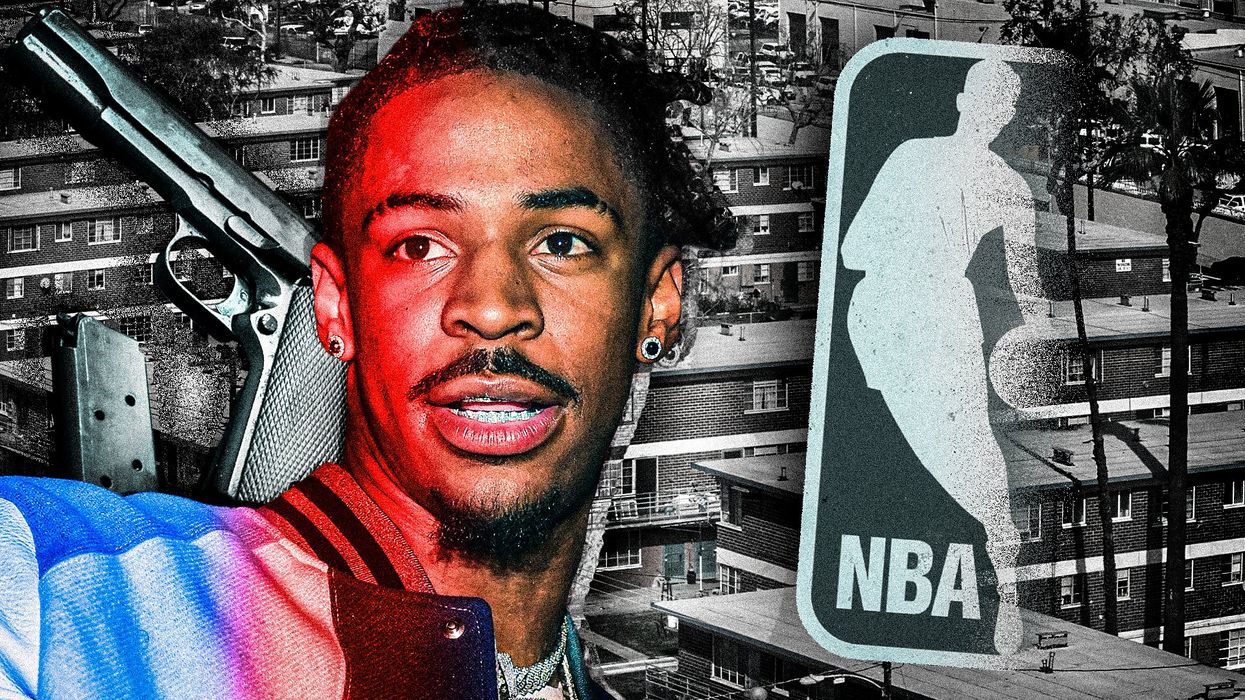
Prince Williams / Contributor | Getty Images

On the surface, the livestream of Ja Morant showing him as a menacing black minstrel is confusing. Why would a 23-year-old NBA superstar cast himself as a gun-toting rapper?
It’s not that confusing when you realize not much has really changed since D.W. Griffith released the movie “The Birth of a Nation” in 1915. Blackface minstrel shows are arguably more popular today than when Griffith’s box-office smash enthralled America with a tale about the assassination of Abraham Lincoln and the Ku Klux Klan heroically subduing sex-obsessed and violent black male savages.
Morant’s gun-brandishing and rapping videos feed a seemingly insatiable American thirst. He appears to be laying the groundwork for an update of Griffith’s work – “Death of a N*gga.” Morant’s knockoff would be an unofficial docudrama about the rise and fall of hip-hop culture, aka the new minstrel show.
This project would chronicle the transformation of hip-hop from 1970s New York City party music to an economic and cultural juggernaut with global reach. It would also show the audience rap music’s artistic evolution. Rappers once promoted songs like “Self-Destruction” and “We’re All in the Same Gang” in the early 1990s as a response to the spike in violent crime that swept cities caught up in the crack epidemic. Now, music labels, artists, and urban radio stations would go bankrupt if there was even a one-month ban on GMO (guns, murder, and opps) music.
“Death of a N*gga” would pay homage to its progenitor “The Birth of a Nation.” The movie broke new ground with its filmmaking technique and cinematography. It was screened at the White House by President Woodrow Wilson. The film was also credited with the resurgence of the Ku Klux Klan and, by extension, lynchings and other brutal acts of violence committed against black men.
To this day, black professors, pundits, and filmmakers regularly refer to the negative impact “The Birth of a Nation” had on American culture. They know the 20th century was marked by a battle for control of the black public image, which itself was as important to the fight for civil rights as boycotts and marches. Black leaders opposed racist propaganda from blackface to minstrel shows because it infused dehumanizing stereotypes into the cultural bloodstream.
These depictions shaped how white Americans saw their fellow citizens, but more importantly, they impacted how black Americans saw themselves.
Now, some of the same people will argue that hip-hop is a vehicle for setting cultural trends – both in America and across the globe – but has no discernible effect on the values of the people who most identify with its artists.
These people are dishonest, deceived, or a combination of both.
Either art, music, and images shape our perceptions, values, and attitudes, or they don’t. The argument for over 30 years seems to be that racial stereotypes are extremely harmful when white people in blackface are promoting them, but relatively harmless when the person rhyming about killing a black man has the same complexion as his victim.
This isn’t just an issue of creative license. Rap music, aided by social media, fuels fights that leave rappers dead. Here are some lyrics from NBA YoungBoy, Ja Morant’s favorite rapper, in the song that was playing in the IG Live video that got the superstar in hot water.
Since I was small, I ain't stand down, b***h, ask my mama, I ain't scared
That p***y n***a said what? She told me "Leave that n***a dead"
Few weeks later, I copped the b***h and bust his head.”
The hip-hop lyric website Genius claims these lines are a reference to a Louisiana rapper named Blvd Quick, who allegedly said the following about NBA YoungBoy’s mom on IG Live: “Man f*ck youngboy mama, Sheronda Gaulden, don’t tell me sh*t about that b*tch.”
The explanation on Genius continues: “A few weeks later, Quick was shot to death in an apartment complex with a bullet wound to the head.”
The most frequently cited reasons for private gun ownership in this country are to protect against government tyranny, defense against criminals, and hunting. The rappers whom NBA stars quote most often do a different kind of hunting in our cities. The long list of “n*ggas” they rap about killing would have made a Klan grand wizard in 1923 weep with pride and say, "These boys are doing a better job than we ever could.”
This is the culture that Ja Morant is promoting.
More importantly, this is what multibillion-dollar corporations and organizations like the NBA and NFL are legitimizing every time they pay GMO rappers to perform at a halftime show or pipe their music into the stadium speakers. The leagues are fine promoting rappers like YoungBoy or 21 Savage as long as players don’t try to mimic their behavior.
Hopefully the NBA realizes that being a patron of hip-hop’s death culture has real consequences. Men who choose street life, whether in neighborhood crews or organized crime, know exactly what they sign up for. But too often in black neighborhoods, the victims of senseless shootings are innocent children and other “civilians” who didn’t pledge their loyalty to any gang. The kids in Memphis who see Ja Morant as their role model have a better chance of becoming the collateral damage of street violence than of playing professional basketball.
This is why Ja Morant and the NBA both need to get out of the dead n*gga business.